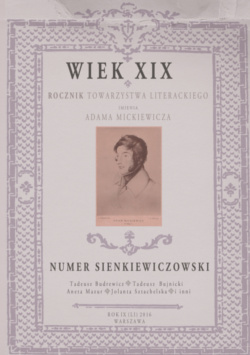Don Juan à l’égyptienne
Don Juan à l’égyptienne
Author(s): Dariusz TrześniowskiSubject(s): Polish Literature
Published by: Towarzystwo Literackie im. Adama Mickiewicza
Keywords: Ancient Egypt; Bolesław Prus; historical novel; “Pharaoh”
Summary/Abstract: “Pharaoh” by Boleslaw Prus is read as a text which, under the guise of a conventional historical novel, conceals a reflection of the present: the state and politics. The author of this article, while accepting the traditional reading, also proposes a new reading of the novel. The employment of cultural studies methodology (E. Said, R. Barthes, M. Foucault) brings out the novel’s universal existential meaning. “Pharaoh” is therefore an uninhibited novel about a man, who is looking for love and personal happiness. Prus, androcentric in his contemporary novels, gives the right to happiness to women, as well as rights within the society. However, the lives of “Pharaoh’s” protagonists are exclusively hedonistic. Marriages and families are unstable, as is love, and even friendship. The man discovers his egoistic and narcissistic nature, it dawns on him that he should enjoy every moment of his life, while he is still young. The novel by Prus is a great accolade to youth. Its alternative is a long, monotonous, ascetic life, which leads to success and gives power. There is no happy midpoint in-between.
Journal: Wiek XIX. Rocznik Towarzystwa Literackiego im. Adama Mickiewicza
- Issue Year: LI/2016
- Issue No: 1
- Page Range: 197-211
- Page Count: 18
- Language: Polish

